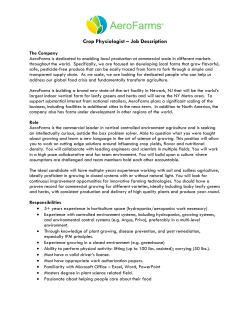
Biological Control on Greenhouse Herb Crops
BioControl in the Greenhouse Sponsored by: Start with making a list of key herbs that you grow. y Note which ones had problems in other years with certain insects and mites. y Decide what your “Problem Children” are and monitor them closely y 12:00 to 12:30 Eastern BIOLOGICAL CONTROL ON HERBS Stanton Gill University of Maryland Extension sgill@umd.edu y Spider mite prone herbs: y Mints Sage Lemon grass Lemon balm Hyssop Winter Savory y y y y y Low risk chemicals that control spider mites: y Azadirachtin (Azatin, Econem, Neemix, Orzazin, Neemazod) y Horticultural oils (PureSpray, SuffOil-X) y Insecticidal soaps (M-Pede, Concern, DESX) y Biological control for mites: Amblyseius californicus released after Phytoseilus persimilis (5 – 6 per sq ft) of area. y Sweet Bay : Bay psyllids sucker, Trioza alacris Sweet Bay : Bay psyllids sucker, Trioza alacris Best control: Don’t bring it into the greenhouse y Low risk pesticide control: y Azadirachtin (Azatin, Neemazod, AzaDirect, Neemix, Ecozin) y Sweet Bay : y Pest Bay roller caterpillar, family Tortricidae y Control options: y Low risk insecticides: Spinosad (Conserve , Entrust). y y Bacillus thuringiensis (Bt) (Dipel, Caterpillar Attack and many other names) y Some insects are wide generalist that hit many herbs – insects such as thrips Thrips prone herbs Tarragon Lavender y Rosemary y Basil y y If you start you own plugs then place piles of Amblyseius cucumeris, predacious mite, (200 per flat)on plug flats. y This establishes predacious mites on plants that are moved into the high tunnels y Thrips control y Use pepper plants as Banker plants . Plants are inoculated with Orius insidious (Minute Pirate Bugs) . Continues to provide thrips control through late spring, summer into fall. Best banker pepper plant is ‘Purple flash”. Start plants in January Plug planting plant for high tunnel growers y y Starting herbs under mist Weekly BotaniGard sprays (3x) • • • • y S. feltiae (entomopathogenic nematodes weekly N. cucumeris (predacious mites broadcast weekly (3x) Finishing herb crop use: • Amblyseius cucumeris mini-sachets • S. feltiae (entomopathogenic • nematode) weekly Thrips control: Misting to finishing Aphid prone e herb b plants Lemon Verbena Oregano y Basil y Sage y y Winged aphid Cast skins Stunted growth Honeydew and sooty mold honeyde w Wide host range Virus vector Sucking insect Asexual reproduction Winged aphids cornicle Aphid s basics Aphid damage Common C ommon aphid aphid s species peciesMelon (cotton) Oleander Aphids. y The green peach aphid is found on tip growth and populations can explode in spring (March through – early June). y Look for the long cornicles on the rear end with black tips and notch head area between the antennae y Green peach Foxglove Potato Chrysanthemum http://aphid.spatialtemporalearth.com/index.php porallearth th h com/i //index d ph hp Melon aphid d- dark green form Green peach aphid common on herbs Melon aphid d do dome ome shaped head capsule. Cornicle dark for full length. Aphid control Good searchers Aphidius colemani wasp that Parasitizes aphid causing aphid mummies (golden-brown and leatherlike) Melon aphid mottled green form Aphidius colemani- good on green peach and melon aphids Aphidius ervi Aphidius ervi- good for potato aphid and other species y If you are thinking of trying biological control of aphids, plan to start your either barley, rye or oats plants in January or February to get the bird cherry oat aphid population established early. It is important to get the parasitic wasp established early in the season before aphids can become established in the greenhouse. - See more at: http://extension.umd.edu/IPM learn/usingbanker-plants-aphid-control-greenhouses The ea aphid phid parasitoid,, A Aphidius colemani coleman niii,, is s released at the rate of 50 Ap Aphidius wasps per 6inch pot of barley plants. Jandricic et al., 2014. Biological Control 76: 28-35 Aphidius s banker plants Bird cherry oat aphid To control ants s–D Denise pu put vaseline put on lip of pot Bird cherry – oat aphid – Rhopalosiphum padi- obtain these from Biological Supply house BioControl in the Greenhouse Question and Answer Time Coming Up Next: 12:30 to 12:55 Eastern Lunch Break Time Topic 12:55 to 1:00 Welcome Back/Questions 1:00 to 1:25 Proactive Approach with a Biological Control Strategy 1:30 to 1:55 Grower Experience with Banker Plants for Aphid Control 2:00 to 2:25 Pesticides- Are They Ever Compatible with a Biocontrol Program? 2:30 to 2:55 The Fundamentals of Biocontrol of Fungal and Bacterial Diseases 3:00 to 3:25 Case Studies of Using Biocontrol for Disease Control in Greenhouse Crops 3:30 to 3:45 Wrap-up/ Questions
© Copyright 2025











